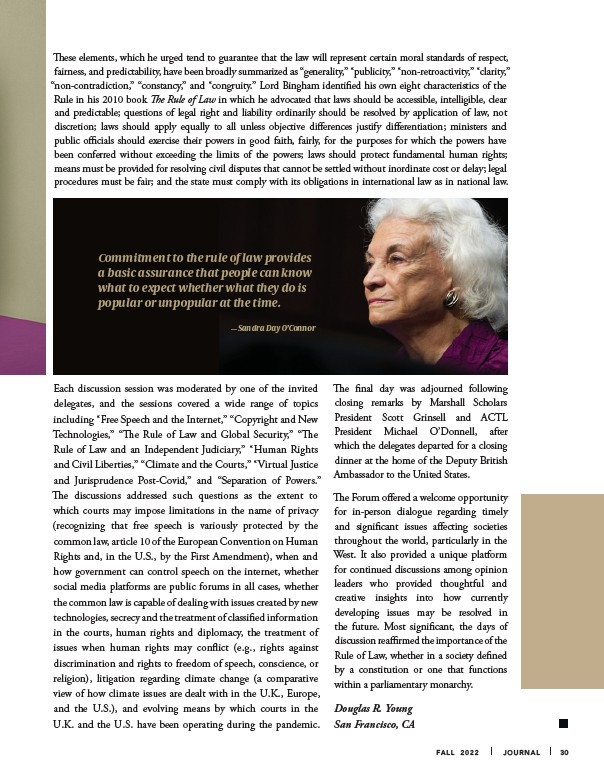
These elements, which he urged tend to guarantee that the law will represent certain moral standards of respect,
fairness, and predictability, have been broadly summarized as “generality,” “publicity,” “non-retroactivity,” “clarity,”
“non-contradiction,” “constancy,” and “congruity.” Lord Bingham identified his own eight characteristics of the
Rule in his 2010 book The Rule of Law in which he advocated that laws should be accessible, intelligible, clear
and predictable; questions of legal right and liability ordinarily should be resolved by application of law, not
discretion; laws should apply equally to all unless objective differences justify differentiation; ministers and
public officials should exercise their powers in good faith, fairly, for the purposes for which the powers have
been conferred without exceeding the limits of the powers; laws should protect fundamental human rights;
means must be provided for resolving civil disputes that cannot be settled without inordinate cost or delay; legal
procedures must be fair; and the state must comply with its obligations in international law as in national law.
Each discussion session was moderated by one of the invited
delegates, and the sessions covered a wide range of topics
including “Free Speech and the Internet,” “Copyright and New
Technologies,” “The Rule of Law and Global Security,” “The
Rule of Law and an Independent Judiciary,” “Human Rights
and Civil Liberties,” “Climate and the Courts,” “Virtual Justice
and Jurisprudence Post-Covid,” and “Separation of Powers.”
The discussions addressed such questions as the extent to
which courts may impose limitations in the name of privacy
(recognizing that free speech is variously protected by the
common law, article 10 of the European Convention on Human
Rights and, in the U.S., by the First Amendment), when and
how government can control speech on the internet, whether
social media platforms are public forums in all cases, whether
the common law is capable of dealing with issues created by new
technologies, secrecy and the treatment of classified information
in the courts, human rights and diplomacy, the treatment of
issues when human rights may conflict (e.g., rights against
discrimination and rights to freedom of speech, conscience, or
religion), litigation regarding climate change (a comparative
view of how climate issues are dealt with in the U.K., Europe,
and the U.S.), and evolving means by which courts in the
U.K. and the U.S. have been operating during the pandemic.
The final day was adjourned following
closing remarks by Marshall Scholars
President Scott Grinsell and ACTL
President Michael O’Donnell, after
which the delegates departed for a closing
dinner at the home of the Deputy British
Ambassador to the United States.
The Forum offered a welcome opportunity
for in-person dialogue regarding timely
and significant issues affecting societies
throughout the world, particularly in the
West. It also provided a unique platform
for continued discussions among opinion
leaders who provided thoughtful and
creative insights into how currently
developing issues may be resolved in
the future. Most significant, the days of
discussion reaffirmed the importance of the
Rule of Law, whether in a society defined
by a constitution or one that functions
within a parliamentary monarchy.
Douglas R. Young
San Francisco, CA
Commitment to the rule of law provides
a basic assurance that people can know
what to expect whether what they do is
popular or unpopular at the time.
— Sandra Day O’Connor
FALL 2022 JOURNAL 30